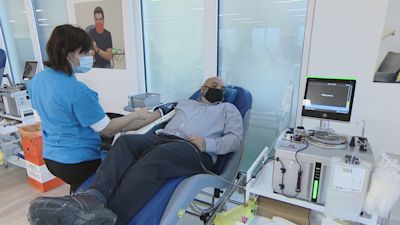What's involved in donating blood plasma and can you help?

The NHS Blood and Transplant Service is urging people to donate blood plasma to help save lives during the pandemic.
Plasma is needed for clinical trials to see if antibodies from people who have had Covid-19, can help others who are seriously ill. In Reading a new donation centre has opened and they're urgently appealing for donors.
They particularly want plasma from men and people from different ethnic backgrounds.
The volunteers at the Reading donation centre have all had coronavirus. but they've fully recovered and are now donating their plasma, the liquid part of blood, to try to help others.
Volunteers have to have a full health check first and if they're well enough they can begin the donation.
Donna Blofield, Donor Centre Manager
Donations collected at the centre in Reading will be used in clinical trials to see if the antibody-rich blood plasma found in people who've had coronavirus, could benefit patients struggling to fight the disease.
Donors with high levels of antibodies are:
male
over 35
were ill enough with COVID-19 to be treated in hospital
are often from Asian communities
The Reading donation centre is open and ready for business but they do need more donors. anyone over 17 who has had coronavirus can volunteer by registering online and booking an appointment.
Professor Mike Murphy, Consultant Haematologist
The results of the trials are expected in a few weeks time so stocks of plasma are being collected now, so they'll be ready for use if the treatment is approved.
What is the process for donating blood plasma?
Blood plasma
Blood plasma is a yellowish liquid that makes up about half your blood volume. After a virus, your plasma contains antibodies that help fight infection.
A transfusion of plasma from someone who has recovered from coronavirus may help people who are still ill. Donated plasma is being stored so that if the trials show benefits to patients, there are stocks ready to use at hospitals around the country.